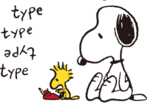小河,溪流。流?。
Sh? n? b? c?i zài shítou shàngguò hé.
史努比?在石?上?河。
Snoopy is crossing the stream by stepping on stones.
スヌーピーは石の上を飛びながら流れを渡っているところです。
Xi?o x? jiùshì xi?o héliú.
小溪就是小河流。
A stream is a little river.
小川というのは、小さな川のことです。
Zài b?zhí, zh?i xi?o de xiàn dàoshàng liúdòng de d?ngx?, y?u shíhòu ch?ng wéi y?dào shu?liú.
在?直,窄小的?道上流?的?西,有?候称?一道水流。
Something that moves in a straight, narrow line is sometimes called a stream.
真っすぐな細い線になって動くものも、時には流れと呼ばれます。
Qìch? chu?nliúbùx? jí sh? érguò.
汽?川流不息急?而?。
A stream of cars sped by.
車の流れがスピードを出して走りすぎました。
Gu?ngxiàn cóng chu?nghù zhíshè jìnlái.
光?从窗?直射?来。
The light streamed in the window.
光が窓に流れ込みました。

人気ブログランキング


